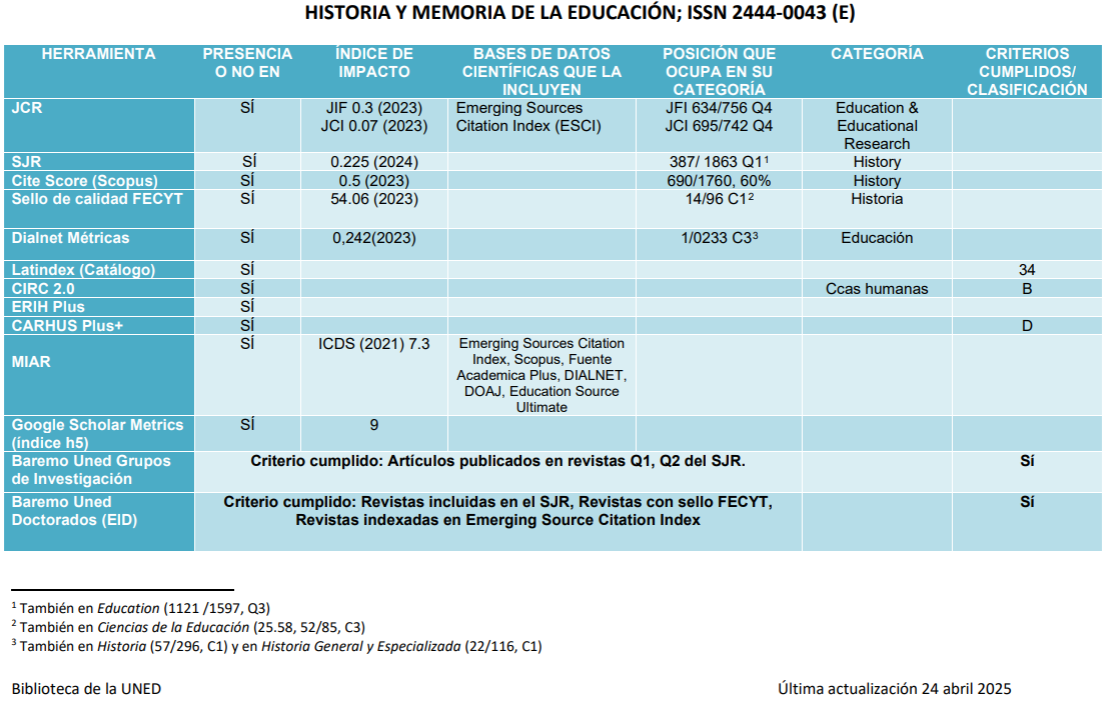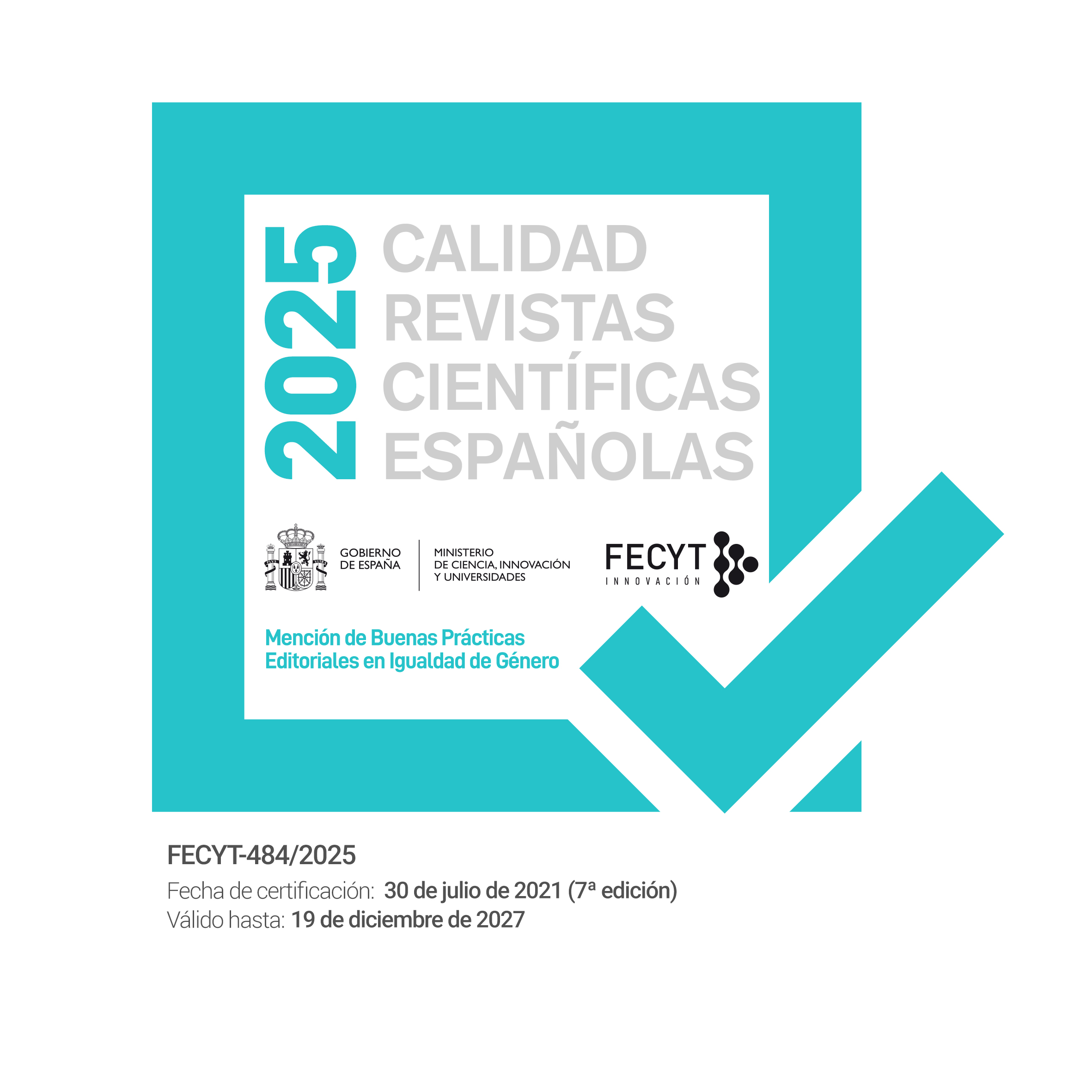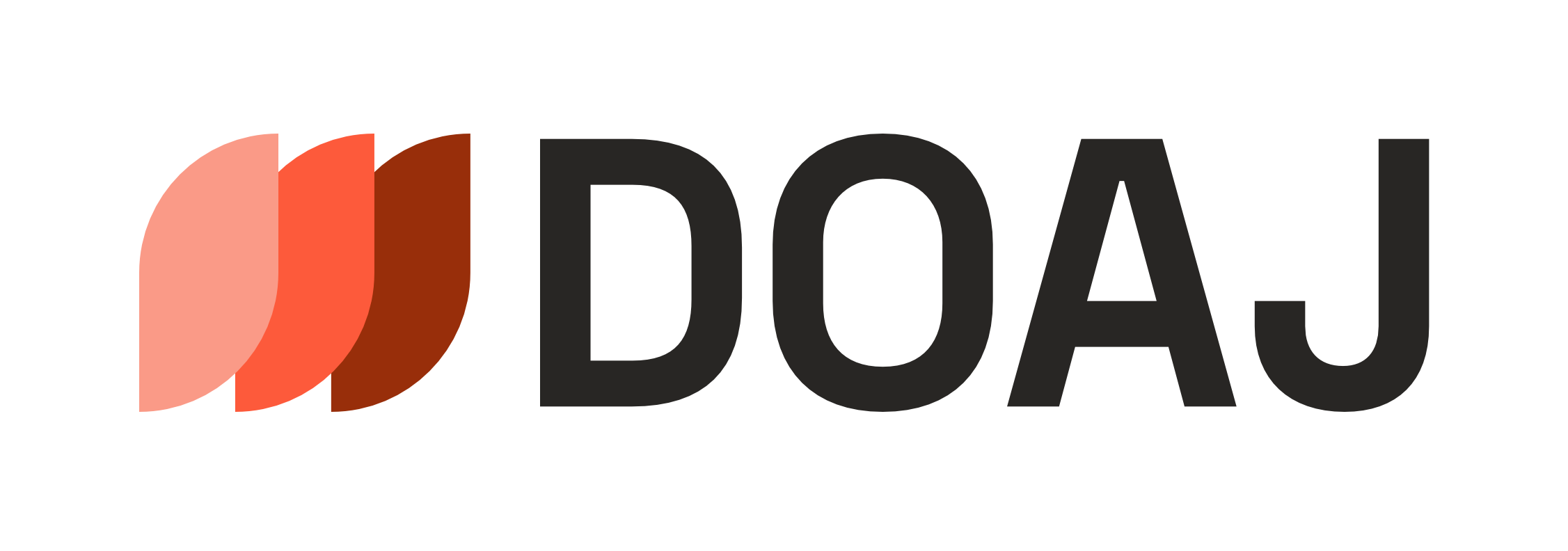About the Journal
Focus and Scope
The journal Historia y Memoria de la Educación publishes research articles, bibliographic essays, reviews, and other contributions pertaining to the field of the History of Education.
Manuscripts submitted to Historia y Memoria de la Educación for publication must meet the criteria of academic rigor, depth, originality, and specialization expected of a scientific-academic journal. They must also constitute a relevant and significant contribution to the field of the History of Education.
Manuscripts submitted to Historia y Memoria de la Educación for publication must be unpublished; they cannot have been previously published in any format or medium (graphic or electronic). The author(s) must submit a sworn statement to this effect when submitting the text.
Submitted manuscripts cannot be simultaneously under review for publication in another journal. The author(s) must submit a sworn statement to this effect along with the text.
Peer Review Process
All manuscripts published in the journal Historia y Memoria de la Educación will be previously reviewed by two external referees, using a double-blind system.
In the event of any significant discrepancies, the Editorial Board will request review by a third reviewer.
The Editorial Board reserves the right to interpret these regulations in the case of articles that have been partially published or in the case of expanded or reduced versions of previously published material.
The Editorial Board will ensure that manuscripts meet the formal requirements and that their content complies with the editorial policies of Historia y Memoria de la Educación. If the initial evaluation is positive, the work will be subject to further evaluation by two external reviewers. If the initial evaluation is negative, the article will not be considered for publication.
After receiving the evaluations, the Editorial Board will make a decision on publication, which may include suggestions for revising the original text. The author(s) will have one month to submit these revisions. If significant modifications are required, the revised text will be sent back to the reviewer for final approval. In the event of significant discrepancies, the editorial team will request a third reviewer.
Authors of works accepted for publication must complete a rights assignment form for digital dissemination of the article.
Open Access Policy
This journal provides immediate and free access to its content based on the principle of making research freely available to the public, thereby fostering a greater global exchange of knowledge.
Historia y Memoria de la Educación is a Diamond journal, that is, an open-access academic journal funded by an academic institution, which charges no fees to authors or readers and whose content is shared under open licenses and without registration.
The works are licensed under a Creative Commons Attribution-NonCommercial 4.0 International License.

Authors are authorized to post the published version of their articles (offprint in PDF) or the link to their article on the journal's website in open-access institutional or thematic repositories.
Special Issue Proposals
Proposals for special issues should be submitted to the Editorial Board and should include:
- The name of the person(s) submitting the proposal, their university or institution, their professional address, and an email address.
- The special issue topic, along with a brief description or exposition of that topic.
- The identity of the contributors, their universities or institutions, the titles of their contributions, and a summary of each.
Journal Regulations
To download a PDF of the journal regulations approved by the Spanish Society for the History of Education (SEDHE), click here.
Article Processing Fees
Historia y Memoria de la Educación does not charge article submission fees or article processing fees (APC).
Publication and Editing Ethics
Statement of Ethics and Appropriate Conduct
Historia y Memoria de la Educación adheres to the code of good scientific practices approved by the CSIC in March 2010 and to the good practice agreements adopted by the Committee on Publication Ethics (COPE). All articles published in Historia y Memoria de la Educación, as well as the entire editorial process, adhere to the ethical principles and criteria established in these codes.
The journal's ethical stance toward scientific research—historical, educational, and social—is comprised of three main aspects:
First. The entire editorial team, as well as its advisors and reviewers, are obliged to respect the standards of equality, respect for human rights, parity, and freedom of specialized thought and judgment, while maintaining their neutrality with respect to the theoretical approaches of the original works, duly defended and argued.
Second. We believe that the ethical and moral mission of those who work for this scientific journal is to publish, for both the scientific community and society, rigorously researched articles that advance our field, works based on solid arguments and recognized sources.
Third. To achieve this, we advocate theoretical, epistemological, methodological, and ethical rigor as a way to strengthen the role of science as a tool for democracy, progress, and social cooperation—a science based on knowledge and proposals devoid of demagoguery and grounded in the plural and verifiable social facts of the historical context in which we work.
Fourth. Based on the above, it is strongly recommended that articles use inclusive and gender-neutral language.
It is also recommended, where appropriate, that scientific articles address the variable sex/gender in their research design, methodological proposals, results, or limitations.
EDITORIAL STAFF OBLIGATIONS
Fair Play, Ethical and Transparent Evaluations, and Editorial Independence
The editorial team will evaluate original manuscripts solely on their academic merit—based on criteria such as the importance, originality, validity, and clarity of the study—and their relevance to the journal, regardless of the author(s)' race, gender, sexual orientation, ethnic origin, nationality, political philosophy, institutional affiliation, or beliefs. Decisions regarding the editing and publication of an article are not conditioned by any government policy or the financial interests of any entity outside the journal itself, whose Board of Directors has full authority over editorial content.
Confidentiality
The editorial team undertakes not to disclose information about any manuscript except to the authors themselves and to the reviewers, evaluators, or corresponding editors. It will also not disclose information about submitted manuscripts to anyone other than the authors, reviewers, potential reviewers, editorial advisors, or the corresponding editor, for which it will follow the stipulated procedure.
Disclosure and Conflict of Interest
The editorial board will not use information from a manuscript for its own research purposes without the express written consent of the author(s). Information and ideas obtained by the editorial team during the review of the manuscript will be kept strictly confidential. In the event of a conflict of interest, members of the editorial team will refrain from any involvement in the manuscript of individuals with whom they have a competitive or collaborative relationship; in such cases, they will recuse themselves and request another member of the editorial team to review the manuscript.
Publication Decisions
The editors will ensure that all submitted manuscripts are evaluated by at least two reviewers, experts in the specific field of the manuscript. The editors will decide which manuscripts will be published based on the validity of the work, its relevance to research in the field, the comments received from the reviewers, and applicable legal provisions, taking into account current laws regarding defamation, authorship, and plagiarism.
Research Involvement and Cooperation
The editors will consult with specialists in specific areas of research in the event of ethical issues or potential misconduct related to a submitted manuscript or published text, regardless of whether such misconduct is discovered at any time after publication, even if years have passed. If such ethical misconduct is proven to be justified, the journal will publish a corrigendum.
REVIEWER OBLIGATIONS
Contribution to Editorial Decisions
Peer reviews assist the editorial team in making editorial decisions and improving the quality of manuscripts. They are an essential part of scholarly communication. AP-SMART has established that all researchers and academic staff wishing to contribute to scientific advancement have an obligation to conduct objective reviews.
Promptness
Any specialist who must conduct a review and cannot commit to doing so within the agreed timeframe should immediately notify the editorial team so that an alternative reviewer can be found.
Confidentiality
Every manuscript received for review is a confidential document and should be treated as such. Therefore, all persons involved in the evaluation and editing of the manuscript must guarantee its confidentiality during and after the review process.
Standards of Objectivity
Reviews should be conducted objectively, using clear and substantiated arguments that allow authors to improve their work.
Acknowledgment of Sources
When necessary, reviewers should identify any relevant published work that has not been cited. Any statement that constitutes an observation, derivation, or argument based on information from a previous publication must be accompanied by a corresponding reference.
Disclosure and Conflicts of Interest
Any reviewer who may have a conflict of interest due to a competitive or collaborative relationship, or any type of connection with the author(s) or with companies or institutions associated with the manuscript, is obligated to immediately notify the editorial team. The editors will arrange for an alternative reviewer to evaluate the work.
The material contained in a submitted manuscript may not be used in any way without the express written consent of the author(s). This policy also applies to anyone who has declined the invitation to be a reviewer.
AUTHORS' OBLIGATIONS
Reporting Standards
Authors of original research must present an accurate description of the work performed and its results, along with a discussion of their relevance. The manuscript must contain sufficient details and references to allow for reproduction, and editorial opinions must be clearly identified as such. False or inaccurate statements will be considered unethical behavior and will not be tolerated.
Data Access and Preservation
Authors may be asked to provide raw data from their studies along with their manuscript for editorial review. Furthermore, these raw data must be publicly and easily available, whenever possible. Authors must ensure the accessibility of such data for a minimum of ten years after publication (preferably in an institutional data repository), while ensuring the confidentiality of participants.
Originality and Plagiarism
Authors should only submit completely original manuscripts. Any work or text by others must be properly cited. Published works that influenced the development of the manuscript must also be cited. Plagiarism, which involves passing off the work of others as one's own, or copying or paraphrasing substantial sections of another person's text without citing it, will not be tolerated in any form, as it constitutes unethical and unacceptable conduct.
Multiple, Duplicate, Redundant, or Simultaneous Submissions
Manuscripts describing essentially identical research should not be published in more than one journal or in any other format. Therefore, manuscripts published in other publications will not be considered for publication. Consequently, submitting a manuscript simultaneously to more than one journal is considered unethical and unacceptable conduct.
Manuscript Authorship
Only individuals who meet the following authorship criteria and assume public responsibility for the content may be considered authors: (i) They have made significant contributions to the conception, design, execution, data collection, or interpretations used in the study; (ii) They have conducted a critical review of the manuscript; and (iii) They have supervised and approved the final version of the document and accepted its submission for publication. All individuals who have made substantial contributions to the development of the manuscript (technical assistance, drafting and editing, general support) but who do not meet the criteria for authorship may not be listed as authors, although their names may appear, provided they have given their written consent, in the “Acknowledgments” section. The author(s) should ensure that only appropriate co-authorship (as described above) is indicated in the list of authors and should verify that all co-authors have reviewed and approved the final version of the manuscript and agreed to its submission for publication.
Disclosure and Conflicts of Interest
Before final acceptance of an article, authors must disclose, as soon as possible, any potential conflicts of interest. This is usually addressed by completing a specific form and signing a declaration upon submission of the manuscript. Examples of potential conflicts of interest that must be declared include financial ones, such as honoraria, educational or other grants, affiliations, employment, consultancies, equity participation, or financial interests. All sources of financial support or funding must be disclosed, including the grant code or reference number.
Acknowledgment of Sources
Authors should endeavor to appropriately cite the work of others, as well as other publications that have had a significant influence on the study conducted. Information obtained privately (i.e., from conversations, correspondence, or discussions with third parties) should not be used without the express written consent of the source. Information obtained through participation in confidential services, such as peer review of manuscripts or grant applications, should also not be used without the express written consent of the person or persons involved in such services. Peer Review
Authors must participate in the peer review process and meet the deadlines established by the editorial team. In the case of an initial request for modifications, authors must respond to the reviewers' comments systematically and clearly, point by point, before resubmitting the article to the journal within the stipulated deadline.
Fundamental Errors in Published Works
If an author discovers significant errors or inaccuracies in their own published work, they must immediately notify the journal's editorial team and collaborate in correcting the document. This correction may take the form of an errata or a retraction. If the editorial team discovers a significant error or inaccuracy in a work published through a third party, the author of the article must respond immediately, either by correcting or retracting the article, or by providing the editorial team with relevant evidence regarding the concerns surrounding the work in question.
JOURNAL OBLIGATIONS
Management of Unethical Editorial Conduct Cases
In the event of suspected or proven scientific misconduct, fraudulent publication, or plagiarism, the journal's editors will take all necessary measures to clarify the situation and address the article in question. This may include the immediate publication of an errata, an explanation, or, in more serious cases, the retraction of the work in question. The editors will take all reasonable measures to identify and prevent the publication of articles that show signs of misconduct, and under no circumstances will they tolerate or encourage such conduct.
Access to Journal Content
The editorial team is committed to preserving scholarly research and ensuring the accessibility of its content by maintaining its own digital archives.
Preservation Policy
Digital preservation is understood as a set of processes and activities that ensure that information currently existing in digital formats is backed up and distributed to guarantee long-term, continuous access.
On the other hand, the journal is part of the private LOCKSS network of the Public Knowledge Project (PKP-PLN): https://portal.issn.org/resource/ISSN/2444-0043
The preservation policy also includes assigning DOIs to the journal title, each issue, and each article.
Historia y Memoria de la Educación is supported by the UNED IT services, which are responsible for its preservation through backup copies.
Interoperability Protocol
History and Memory of Education provides article-level metadata in a standard, interoperable, non-proprietary, and public domain format.
It also uses the OAI-PMH (Open Archives Initiative – Protocol for Metadata Harvesting) interoperability protocol to collect metadata from published content.
Collection path: https://revistas.uned.es/index.php/HMe/oai
Metadata format: Dublin Core Metadata
Indexing
History and Memory of Education is indexed in:
- DOAJ
- Dialnet
- ESCI
- IRESIE
- Latindex
- REDIB
- MIAR
- ISOC
- SCILIT
Anvur (Italia) Rivista Clase A 11D1
Below is the table prepared by the UNED Library with all the indicators for 2024, the last year evaluated:

Notice on the Use of Artificial Intelligence
If artificial intelligence is used at any stage of the submitted research, authors will be required to clearly highlight this in a footnote at the beginning of the article, indicating the specific section or sections where artificial intelligence was used. This indication is intended to inform readers about the use of this technology, providing greater transparency and understanding of its application in the submitted research. Acceptance of the work is at the discretion of the Editorial Board.
Anti-Plagiarism Policy
This journal will guarantee the originality of all manuscripts by using anti-plagiarism software provided by UNED Publishing. This policy will ensure standards of originality and detect coincidences and similarities between texts submitted for publication and those previously published in other sources. If plagiarism is detected, the manuscript will be rejected for publication.
Equal Opportunity Policy
Editorial Participation:
Historia y Memoria de la Educación will adopt measures to ensure a minimum of 40% women in the composition of its various editorial bodies (Director, Editor, Secretary, Editorial Committee, and Editorial Boards), as well as among the people who review our publications.
Gender Equality in Research:
Authors are encouraged to use inclusive language regarding LGBTQI+ groups, individuals, and communities: the LGBTQI+ population, transgender people, bisexual people, etc.
Based on the above, it is strongly recommended that papers use inclusive and gender-neutral language. It is also recommended, where appropriate, that scientific articles address the variable sex/gender in their research design, methodological proposals, results, or limitations.
INFORMATION ON THE CONSIDERATION OF SEX IN RESEARCH SOURCE DATA
Authors are encouraged to explicitly state whether their research data considers gender.
Use of inclusive language:
It is also recommended that the text submitted to the journal be written in a way that respects inclusive and gender-neutral language.
Sponsors
Hitoria y Memoria de la Educación is the journal of the Spanish Society for the History of Education (SEDHE)
- SEDHE
History of the Journal
At the meeting of the Spanish Society for the History of Education (SEDHE) held in November 2013, the creation of a new scientific journal was agreed upon. The name chosen was History and Memory of Education. The journal, published twice a year, will be directed by Professor Antonio Viñao Frago and will be co-published with the UNED Publications Service.
Historia y Memoria de la Educación is, therefore, the official scientific journal of the Spanish Society for the History of Education.











